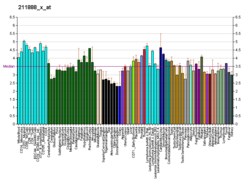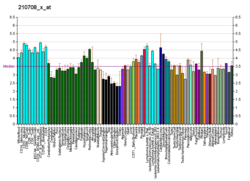Caspase 10
Caspase-10 is an enzyme that, in humans, is encoded by the CASP10 gene.[3]
This gene encodes a protein that is a member of the cysteine-aspartic acid protease (caspase) family. Sequential activation of caspases plays a central role in the execution-phase of cell apoptosis. Caspases exist as inactive proenzymes that undergo proteolytic processing at conserved aspartic residues to produce two subunits, large and small, that dimerize to form the active enzyme. This protein cleaves and activates caspases 3 and 7, and the protein itself is processed by caspase 8. Mutations in this gene are associated with apoptosis defects seen in type II autoimmune lymphoproliferative syndrome. Three alternatively spliced transcript variants encoding different isoforms have been described for this gene.[4]
Interactions
Caspase 10 has been shown to interact with FADD,[5][6][7][8] CFLAR,[7][9][10] Caspase 8,[5][9][11][12] Fas receptor,[5][6][13] RYBP,[14] TNFRSF1A[5][6] and TNFRSF10B.[5][13]
See also
References
- ^ a b c GRCh38: Ensembl release 89: ENSG00000003400 – Ensembl, May 2017
- ^ "Human PubMed Reference:". National Center for Biotechnology Information, U.S. National Library of Medicine.
- ^ Fernandes-Alnemri T, Armstrong RC, Krebs J, Srinivasula SM, Wang L, Bullrich F, Fritz LC, Trapani JA, Tomaselli KJ, Litwack G, Alnemri ES (October 1996). "In vitro activation of CPP32 and Mch3 by Mch4, a novel human apoptotic cysteine protease containing two FADD-like domains". Proc Natl Acad Sci USA. 93 (15): 7464–9. Bibcode:1996PNAS...93.7464F. doi:10.1073/pnas.93.15.7464. PMC 38767. PMID 8755496.
- ^ "Entrez Gene: CASP10 caspase 10, apoptosis-related cysteine peptidase".
- ^ a b c d e Gajate, Consuelo; Mollinedo Faustino (March 2005). "Cytoskeleton-mediated death receptor and ligand concentration in lipid rafts forms apoptosis-promoting clusters in cancer chemotherapy". J. Biol. Chem. 280 (12). United States: 11641–7. doi:10.1074/jbc.M411781200. ISSN 0021-9258. PMID 15659383.
- ^ a b c Vincenz, C; Dixit V M (March 1997). "Fas-associated death domain protein interleukin-1beta-converting enzyme 2 (FLICE2), an ICE/Ced-3 homologue, is proximally involved in CD95- and p55-mediated death signaling". J. Biol. Chem. 272 (10). UNITED STATES: 6578–83. doi:10.1074/jbc.272.10.6578. ISSN 0021-9258. PMID 9045686.
- ^ a b Srinivasula SM, Ahmad M, Ottilie S, Bullrich F, Banks S, Wang Y, Fernandes-Alnemri T, Croce CM, Litwack G, Tomaselli KJ, Armstrong RC, Alnemri ES (July 1997). "FLAME-1, a novel FADD-like anti-apoptotic molecule that regulates Fas/TNFR1-induced apoptosis". J. Biol. Chem. 272 (30). UNITED STATES: 18542–5. doi:10.1074/jbc.272.30.18542. ISSN 0021-9258. PMID 9228018.
- ^ Wang, J; Chun H J; Wong W; Spencer D M; Lenardo M J (November 2001). "Caspase-10 is an initiator caspase in death receptor signaling". Proc. Natl. Acad. Sci. U.S.A. 98 (24). United States: 13884–8. Bibcode:2001PNAS...9813884W. doi:10.1073/pnas.241358198. ISSN 0027-8424. PMC 61136. PMID 11717445.
- ^ a b Micheau, Olivier; Tschopp Jürg (July 2003). "Induction of TNF receptor I-mediated apoptosis via two sequential signaling complexes". Cell. 114 (2). United States: 181–90. doi:10.1016/S0092-8674(03)00521-X. ISSN 0092-8674. PMID 12887920.
- ^ Goltsev, Y V; Kovalenko A V; Arnold E; Varfolomeev E E; Brodianskii V M; Wallach D (August 1997). "CASH, a novel caspase homologue with death effector domains". J. Biol. Chem. 272 (32). UNITED STATES: 19641–4. doi:10.1074/jbc.272.32.19641. ISSN 0021-9258. PMID 9289491.
- ^ Guo, Yin; Srinivasula Srinivasa M; Druilhe Anne; Fernandes-Alnemri Teresa; Alnemri Emad S (April 2002). "Caspase-2 induces apoptosis by releasing proapoptotic proteins from mitochondria". J. Biol. Chem. 277 (16). United States: 13430–7. doi:10.1074/jbc.M108029200. ISSN 0021-9258. PMID 11832478.
- ^ Srinivasula, S M; Ahmad M; Fernandes-Alnemri T; Litwack G; Alnemri E S (December 1996). "Molecular ordering of the Fas-apoptotic pathway: The Fas/APO-1 protease Mch5 is a CrmA-inhibitable protease that activates multiple Ced-3/ICE-like cysteine proteases". Proc. Natl. Acad. Sci. U.S.A. 93 (25). UNITED STATES: 14486–91. Bibcode:1996PNAS...9314486S. doi:10.1073/pnas.93.25.14486. ISSN 0027-8424. PMC 26159. PMID 8962078.
- ^ a b MacFarlane, M; Ahmad M; Srinivasula S M; Fernandes-Alnemri T; Cohen G M; Alnemri E S (October 1997). "Identification and molecular cloning of two novel receptors for the cytotoxic ligand TRAIL". J. Biol. Chem. 272 (41). UNITED STATES: 25417–20. doi:10.1074/jbc.272.41.25417. ISSN 0021-9258. PMID 9325248.
- ^ Zheng, L; Schickling O; Peter M E; Lenardo M J (August 2001). "The death effector domain-associated factor plays distinct regulatory roles in the nucleus and cytoplasm". J. Biol. Chem. 276 (34). United States: 31945–52. doi:10.1074/jbc.M102799200. ISSN 0021-9258. PMID 11395500.
Further reading
- Cohen GM (1997). "Caspases: the executioners of apoptosis". Biochem. J. 326 (Pt 1): 1–16. doi:10.1042/bj3260001. PMC 1218630. PMID 9337844.
- Clements GB, Klein G, Povey S (1975). "Production by EBV infection of an EBNA-positive subline from an EBNA-negative human lymphoma cell line without detectable EBV DNA". Int. J. Cancer. 16 (1): 125–33. doi:10.1002/ijc.2910160114. PMID 170210.
- Baumann K, de Rouffignac C, Roinel N, et al. (1975). "Renal phosphate transport: inhomogeneity of local proximal transport rates and sodium dependence". Pflügers Arch. 356 (4): 287–98. doi:10.1007/BF00580003. PMID 1171445.
- DuBridge RB, Tang P, Hsia HC, et al. (1987). "Analysis of mutation in human cells by using an Epstein-Barr virus shuttle system". Mol. Cell. Biol. 7 (1): 379–87. doi:10.1128/mcb.7.1.379. PMC 365079. PMID 3031469.
- Maruyama K, Sugano S (1994). "Oligo-capping: a simple method to replace the cap structure of eukaryotic mRNAs with oligoribonucleotides". Gene. 138 (1–2): 171–4. doi:10.1016/0378-1119(94)90802-8. PMID 8125298.
- Fernandes-Alnemri T, Takahashi A, Armstrong R, et al. (1996). "Mch3, a novel human apoptotic cysteine protease highly related to CPP32". Cancer Res. 55 (24): 6045–52. PMID 8521391.
- Srinivasula SM, Ahmad M, Fernandes-Alnemri T, et al. (1997). "Molecular ordering of the Fas-apoptotic pathway: The Fas/APO-1 protease Mch5 is a CrmA-inhibitable protease that activates multiple Ced-3/ICE-like cysteine proteases". Proc. Natl. Acad. Sci. U.S.A. 93 (25): 14486–91. Bibcode:1996PNAS...9314486S. doi:10.1073/pnas.93.25.14486. PMC 26159. PMID 8962078.
- Vincenz C, Dixit VM (1997). "Fas-associated death domain protein interleukin-1beta-converting enzyme 2 (FLICE2), an ICE/Ced-3 homologue, is proximally involved in CD95- and p55-mediated death signaling". J. Biol. Chem. 272 (10): 6578–83. doi:10.1074/jbc.272.10.6578. PMID 9045686.
- Bourquin JP, Stagljar I, Meier P, et al. (1997). "A serine/arginine-rich nuclear matrix cyclophilin interacts with the C-terminal domain of RNA polymerase II". Nucleic Acids Res. 25 (11): 2055–61. doi:10.1093/nar/25.11.2055. PMC 146702. PMID 9153302.
- Shu HB, Halpin DR, Goeddel DV (1997). "Casper is a FADD- and caspase-related inducer of apoptosis". Immunity. 6 (6): 751–63. doi:10.1016/S1074-7613(00)80450-1. PMID 9208847.
- Srinivasula SM, Ahmad M, Ottilie S, et al. (1997). "FLAME-1, a novel FADD-like anti-apoptotic molecule that regulates Fas/TNFR1-induced apoptosis". J. Biol. Chem. 272 (30): 18542–5. doi:10.1074/jbc.272.30.18542. PMID 9228018.
- Goltsev YV, Kovalenko AV, Arnold E, et al. (1997). "CASH, a novel caspase homologue with death effector domains". J. Biol. Chem. 272 (32): 19641–4. doi:10.1074/jbc.272.32.19641. PMID 9289491.
- MacFarlane M, Ahmad M, Srinivasula SM, et al. (1997). "Identification and molecular cloning of two novel receptors for the cytotoxic ligand TRAIL". J. Biol. Chem. 272 (41): 25417–20. doi:10.1074/jbc.272.41.25417. PMID 9325248.
- Suzuki Y, Yoshitomo-Nakagawa K, Maruyama K, et al. (1997). "Construction and characterization of a full length-enriched and a 5'-end-enriched cDNA library". Gene. 200 (1–2): 149–56. doi:10.1016/S0378-1119(97)00411-3. PMID 9373149.
- Hu S, Snipas SJ, Vincenz C, et al. (1998). "Caspase-14 is a novel developmentally regulated protease". J. Biol. Chem. 273 (45): 29648–53. doi:10.1074/jbc.273.45.29648. PMID 9792675.
- Ng PW, Porter AG, Jänicke RU (1999). "Molecular cloning and characterization of two novel pro-apoptotic isoforms of caspase-10". J. Biol. Chem. 274 (15): 10301–8. doi:10.1074/jbc.274.15.10301. PMID 10187817.
- Wang J, Zheng L, Lobito A, et al. (1999). "Inherited human Caspase 10 mutations underlie defective lymphocyte and dendritic cell apoptosis in autoimmune lymphoproliferative syndrome type II". Cell. 98 (1): 47–58. doi:10.1016/S0092-8674(00)80605-4. PMID 10412980.
- Satoh S, Hijikata M, Handa H, Shimotohno K (1999). "Caspase-mediated cleavage of eukaryotic translation initiation factor subunit 2alpha". Biochem. J. 342 (Pt 1): 65–70. doi:10.1042/0264-6021:3420065. PMC 1220437. PMID 10432301.
External links
- GeneReviews/NCBI/NIH/UW entry on Autoimmune Lymphoproliferative Syndrome
- The MEROPS online database for peptidases and their inhibitors: C14.011





